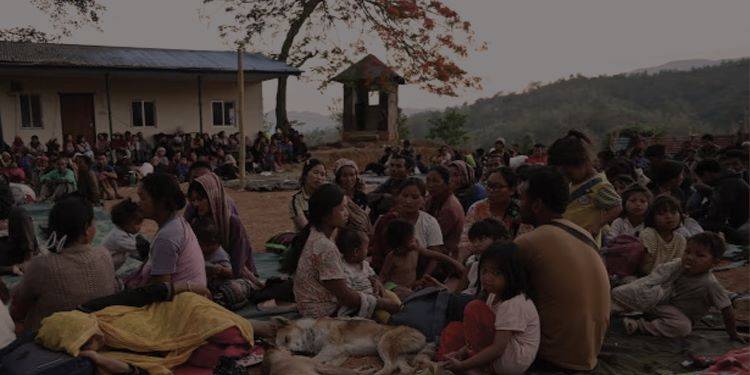
Armed conflicts between the largely Hindu Meitei majority and the primarily Christian Kuki in Manipur state have claimed at least 120 lives since May.
The army rescued teacher Ranjana Moirangthem after she spent a horrific night hiding in a room with 25 neighbors as gun conflicts between gangs raged all around them. She was one of the 50,000 people who were forced to leave.
A Meitei woman named Moirangthem who lived in Churachandpur's Kuki-only neighbourhood fled with nothing save the clothing she was wearing. She forgot the credentials she needed to obtain employment in her haste.
Later, she begged a Kuki acquaintance to save her priceless papers but was told that her house was probably one of the hundreds that had been set on fire.
An estimated 50,000 individuals have been displaced by the violence, and many are currently sleeping in temporary camps or lodging for the homeless.
"I was a teacher," she affirmed. "I have nothing to show my qualifications, so I don't know what to do."
She currently subsists in a congested camp in Moirang district on aid from the government and charitable organizations, where 250 people share a guesthouse with mattresses filling every square inch of the floor.
She responded, "I just want to go back." "I have spent my entire life in Churachandpur; it is also my home."
Another Meitei in the same camp, L. Sonia, claimed that when gangs ransacked her Churachandpur locality, she made frantic calls to local leaders.
"You do realize their issue is with the government? She asked fiercely, "Why do you set our houses on fire?
"After floods, people are relocated to relief camps, but they are allowed to return home... What should we do?
Long a hotbed of hostilities between many ethnic groups, the remote regions of northeast India are located between Bangladesh, China, and Myanmar.
Conflict broke out in Manipur due to a number of factors, including rivalries for land and government positions. Both sides blamed the state and federal governments for their failure to put an end to the bloodshed.
Conflict arose in Manipur for a variety of reasons, including competing for land and government positions.
Amit Shah, India's interior minister, stated that the government "stands shoulder-to-shoulder with the people of Manipur" and vowed that an "impartial investigation" into the violence will be conducted.
The army rescued teacher Ranjana Moirangthem after she spent a horrific night hiding in a room with 25 neighbors as gun conflicts between gangs raged all around them. She was one of the 50,000 people who were forced to leave.
A Meitei woman named Moirangthem who lived in Churachandpur's Kuki-only neighbourhood fled with nothing save the clothing she was wearing. She forgot the credentials she needed to obtain employment in her haste.
Later, she begged a Kuki acquaintance to save her priceless papers but was told that her house was probably one of the hundreds that had been set on fire.
An estimated 50,000 individuals have been displaced by the violence, and many are currently sleeping in temporary camps or lodging for the homeless.
"I was a teacher," she affirmed. "I have nothing to show my qualifications, so I don't know what to do."
She currently subsists in a congested camp in Moirang district on aid from the government and charitable organizations, where 250 people share a guesthouse with mattresses filling every square inch of the floor.
She responded, "I just want to go back." "I have spent my entire life in Churachandpur; it is also my home."
Another Meitei in the same camp, L. Sonia, claimed that when gangs ransacked her Churachandpur locality, she made frantic calls to local leaders.
"You do realize their issue is with the government? She asked fiercely, "Why do you set our houses on fire?
"After floods, people are relocated to relief camps, but they are allowed to return home... What should we do?
Long a hotbed of hostilities between many ethnic groups, the remote regions of northeast India are located between Bangladesh, China, and Myanmar.
Conflict broke out in Manipur due to a number of factors, including rivalries for land and government positions. Both sides blamed the state and federal governments for their failure to put an end to the bloodshed.
Conflict arose in Manipur for a variety of reasons, including competing for land and government positions.
Amit Shah, India's interior minister, stated that the government "stands shoulder-to-shoulder with the people of Manipur" and vowed that an "impartial investigation" into the violence will be conducted.

